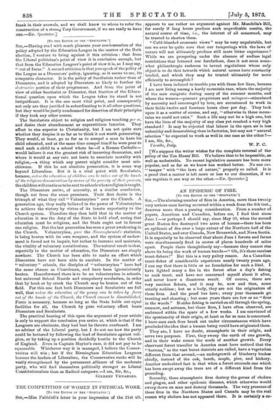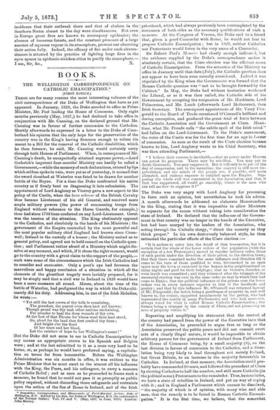AN EPIDEMIC OF FIRE.
[TO THE EDITOR OF THE "SPECTATOR."] SIR,—The alarming number of fires in America, more thaa twenty very serious ones having occurred within a week from the 4th inst.,. deserves more than a passing consideration. From a number of papers, American and Canadian, before me, I find that since. June 1—or perhaps I should say, since May 30, when the second great Boston fire destroyed two acres of houses—there has been an epidemic of fire over a large extent of the Northern half of the United States, and over Canada, New Brunswick, and Nova Scotia. It is especially to be observed that'about June 1 forests and farms. were simultaneously fired in scores of places hundreds of miles apart. People there thoughtlessly say—because they cannot rise above its being the work of human hands—" Oh, it's those careless trout-fishers I" But this is a very paltry reason. As a Canadian trout-fisher of considerable experience nearly twenty years ago, I can say that there is little or no foundation for such a libel. I have lighted many a fire in the forest after a day's fishing. to cook trout, and have not concerned myself about it after,. and never knew a disastrous result. Of course, there are very careless fishers, and it may be, now and then, some utterly reckless ; but as a body, they are not the originators of these fires. And the proof lies here ; every year thousands go. trouting and shooting ; but some years there are few or no "fires. in the woods." Besides fishing is carried on all through the spring, summer, and autumn, but these fires, I have often observed, are- embraced within the space of a few weeks. I am convinced of the spontaneity of their origin, at least as far as man is concerned. I have seen such fires break out under circumstances which have precluded the idea that a human being could have originated them.
They are, I have no doubt, atmospheric in their origin, and serve two purposes. First, they sweep the earth of one growth, and in their wake comes the seeds of another growth. Every observant forest traveller in America must have noticed that the "barrens," as the vast burnt districts are called, have a vegetation. different from that around,—an undergrowth of blueberry bushes chiefly, instead of the oak, beech, maple, pine, and hickory. Another undoubted fact is that when a forest succeeds one which. has been swept away the trees are of a different kind from the preceding.
Secondly, these atmospheric fires destroy the germs of cholera and plague, and other epidemic diseases, which otherwise would sweep down on man and destroy thousands. The very presence of these fires in the Northern States and Canada may be the real reason why cholera has not appeared there. It is certainly a co-
incidence that their outbreak there and that of cholera in the Southern States almost to the day were simultaneous. But even in Europe great fires are known to accompany epidemics ; the absence of immense forests, and the constant presence of a large amount of aqueous vapour in its atmosphere, prevent our observing their action fully. Indeed, the efficacy of fire under such circum- -stances is attested by the practice of lighting large fires in the open spaces in epidemic-stricken cities to purify the atmosphere.—



































 Previous page
Previous page